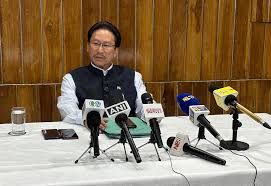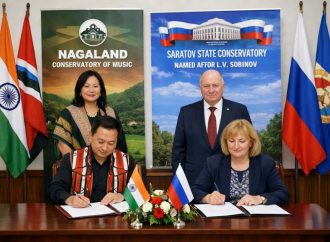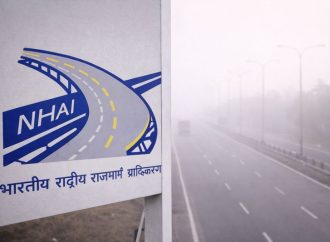State Opposes New Constitutional Article for Frontier Nagaland The Nagaland government has strongly opposed any move to alter Article 371A, which protects the state’s special status under the Constitution. This comes amid reports suggesting the creation of a new constitutional provision—possibly Article 371K—to govern the proposed Frontier Nagaland Territory (FNTA). Addressing the media in Kohima
State Opposes New Constitutional Article for Frontier Nagaland
The Nagaland government has strongly opposed any move to alter Article 371A, which protects the state’s special status under the Constitution. This comes amid reports suggesting the creation of a new constitutional provision—possibly Article 371K—to govern the proposed Frontier Nagaland Territory (FNTA).
Addressing the media in Kohima after the recent cabinet meeting, Minister for Power and Parliamentary Affairs and government spokesperson K.G. Kenye described the proposal as “unacceptable.” He warned that introducing a separate article could weaken Nagaland’s territorial and constitutional unity.
Cabinet to Seek Clarification from Centre
Following detailed discussions, the state cabinet has decided to send a full delegation to New Delhi to meet officials from the Union Home Ministry. The delegation aims to seek urgent clarification about the proposed constitutional change.
Kenye explained, “If a new article is created, it would separate FNTA from Article 371A, excluding it from Nagaland’s existing constitutional framework. This is not acceptable.”
Background of FNTA Talks
The talks between the Centre and the Eastern Nagaland Peoples’ Organisation (ENPO) began in 2010 and remained bilateral until last year, when the state government joined as a third party. According to Kenye, many important documents related to these discussions were only recently shared with the state cabinet.
He added that all parties—Centre, ENPO, and the Eastern Nagaland Legislators’ Union (ENLU)—had previously agreed that FNTA would fall under Article 371A. Therefore, the suggestion of a separate constitutional article was unexpected and requires immediate explanation.
Autonomy Demands and Constitutional Integrity
Kenye emphasized that while the state supports granting legislative, administrative, and financial autonomy to FNTA, the constitutional status must remain unchanged. He noted, “Legislation, finance, and judiciary matters can be negotiated. But the core constitutional framework is non-negotiable.”
The cabinet also discussed ENLU’s proposal for ex-officio appointments to the FNTA regional council. Differences mainly concern voting rights and council composition, which Kenye described as “negotiable.”
Building Trust and Next Steps
Kenye acknowledged the public’s suspicion toward the Centre due to past exclusion from talks. However, he expressed optimism that the new tripartite format has improved trust.
The cabinet plans to visit Delhi soon after the Independence Day celebrations to address these issues. Kenye urged citizens to remain calm and mature, assuring that every decision is made to protect Nagaland’s unity and welfare.
Nagaland Cabinet Approves Panel to Review Job Reservation Policy
Seven-Member Commission to Examine Job Quotas
During the same cabinet meeting, K.G. Kenye announced the formation of a seven-member Reservation Review Commission. This body will evaluate the effectiveness and relevance of Nagaland’s job reservation policy, which has been in place for nearly 48 years.
The government has observed mixed public opinions. Some call for a complete overhaul, while others argue that socio-economic inequalities persist, justifying the policy’s continuation.
Commission Composition and Mandate
The commission will be led by a retired senior IAS officer with strong administrative experience. Members will include representatives nominated by:
-
Eastern Nagaland Peoples’ Organisation (ENPO)
-
Central Nagaland Tribes Council (CNTC)
-
Tenyimi Union Nagaland (TUN)
Additionally, three official members from the government’s administrative departments will join.
The commission must submit its report within six months of appointment. However, its recommendations may coincide with the caste-based census scheduled by the Centre in January 2026.
Kenye clarified the government will respect tribal groups’ nominations without interference.
Progress and Challenges in Implementing Inner Line Permit (ILP)
Successful Rollout in Western Nagaland
Kenye reported that the phased implementation of the Inner Line Permit (ILP) system has made good progress, especially in Dimapur, Chümoukedima, and Niuland. He praised the cooperation between civil society groups, the public, and government agencies for these early successes.
Legal Background and Enforcement
Though based on the 1873 Bengal Eastern Frontier Regulation (BEFR), ILP lacked formal legal status for decades. It only became law in 2019 through an amendment to the Citizenship Act.
The cabinet’s sub-committee is closely monitoring ILP enforcement, identifying several categories of non-Naga residents.
Kenye urged the public to cooperate with authorities and avoid vigilantism during ILP checks. Undocumented individuals will be handed over to administration for proper action.
Conclusion
The Nagaland government remains committed to protecting the state’s special constitutional status, ensuring fair job policies, and effectively implementing ILP. Authorities continue to engage stakeholders and pursue dialogue to maintain peace and unity across the state.



















Leave a Comment
Your email address will not be published. Required fields are marked with *